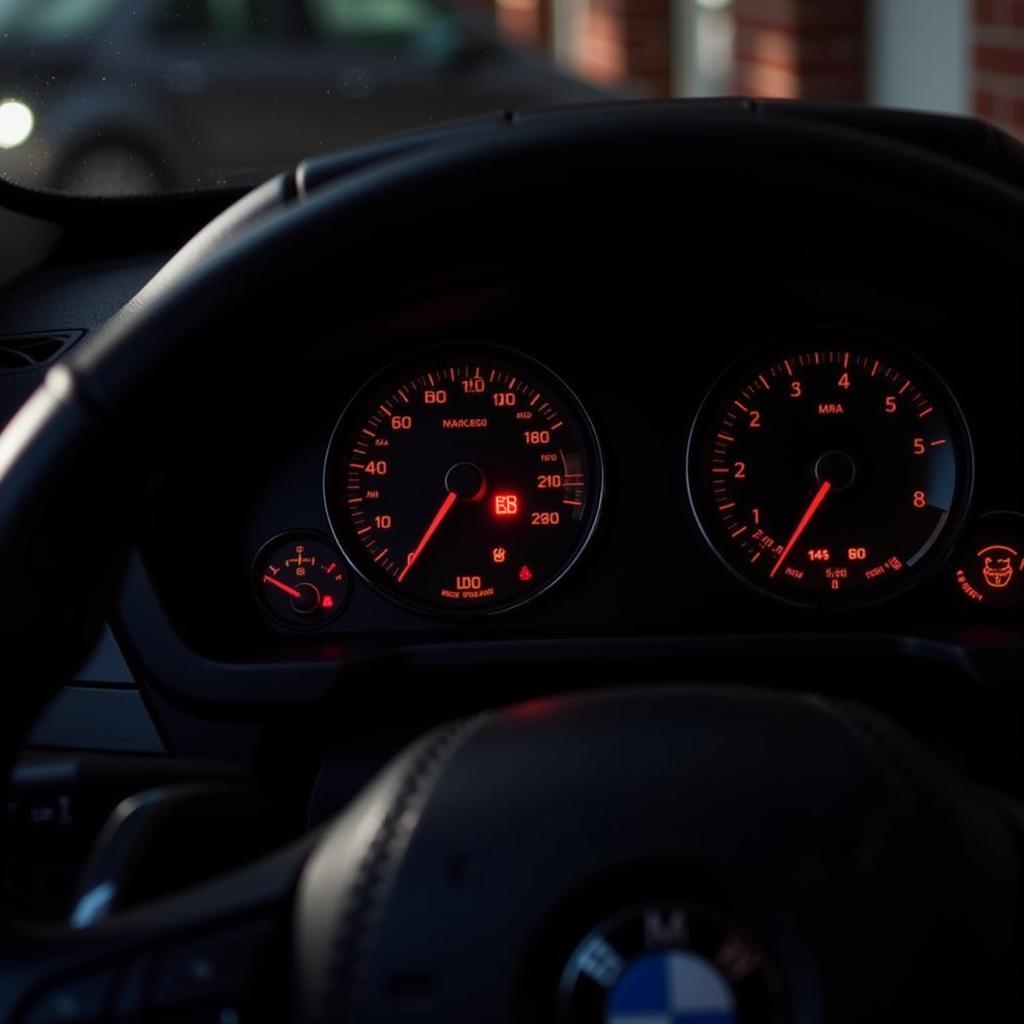Seeing the check engine light, oil light, and battery light illuminated on your dashboard can be a nerve-wracking experience. This trifecta of warning lights signals a potential problem that requires immediate attention. Ignoring these warnings can lead to costly repairs, or even worse, leave you stranded on the side of the road. This article will help you understand the potential causes and guide you on the next steps to take.
Decoding the Dashboard: What Each Light Means
Understanding what each light represents is crucial for effective troubleshooting. The check engine light is a general indicator of a potential issue with the engine’s emissions system or other electronic components. The oil light warns of low oil pressure, which can lead to severe engine damage if ignored. Lastly, the illuminated battery light signals a problem with the charging system.
Check Engine Light: A Broad Spectrum of Issues
The check engine light can be triggered by a wide range of problems, from a loose gas cap to a faulty oxygen sensor. It’s important to have the diagnostic trouble codes (DTCs) read using an OBD-II scanner. This will pinpoint the specific issue and help guide the repair process. ford focus seat belt warning light stays on This article provides an example of how a seemingly unrelated issue can trigger warning lights.
Oil Light: Low Oil Pressure Danger
The oil light indicates insufficient oil pressure to lubricate the engine components. This can be due to low oil levels, a failing oil pump, or a clogged oil filter. Continuing to drive with low oil pressure can cause catastrophic engine damage.
Battery Light: Charging System Malfunction
The battery light signifies a problem with the charging system, likely the alternator. A faulty alternator cannot recharge the battery, eventually leading to a dead battery and a stalled vehicle.
Check Engine Light, Oil Light, and Battery Light On: Common Causes and Solutions
While each light signifies a specific area of concern, several underlying issues can trigger all three simultaneously. A failing alternator can cause low voltage, which can affect the engine control unit (ECU) and trigger the check engine light. Low voltage can also cause the oil pressure sensor to malfunction, illuminating the oil light.
What to Do When All Three Lights Come On
- Pull over safely: As soon as you notice all three lights illuminated, find a safe place to pull over and turn off the engine.
- Check the battery connections: Ensure the battery terminals are clean and securely connected. Corrosion can impede the flow of electricity.
- Check the oil level: Inspect the oil dipstick and add oil if necessary. However, if the oil light remains on after adding oil, do not continue driving.
- Get a diagnostic scan: Have a qualified technician read the DTCs from the OBD-II port to identify the root cause of the problem. brake pad warning light vw golf mk5 Sometimes seemingly unrelated issues, like worn brake pads, can indirectly affect other systems.
- Seek professional help: Attempting to diagnose and repair complex electrical issues without proper knowledge and tools can worsen the problem.
“When multiple warning lights illuminate simultaneously, it’s crucial to approach the diagnosis systematically,” advises automotive expert, Robert Hernandez. “Addressing each light individually without considering the interconnectedness of the systems can lead to misdiagnosis and unnecessary repairs.”
Conclusion: Don’t Ignore the Warning Signs
Ignoring the check engine light, oil light, and battery light can lead to significant engine damage and costly repairs. Prompt diagnosis and repair are essential to maintaining the health and longevity of your vehicle. By understanding what each light means and taking the appropriate steps, you can avoid potential headaches and ensure a safe and reliable driving experience. Don’t delay – address the issue today!
“Preventive maintenance and regular inspections are key to avoiding these warning light scenarios,” adds Hernandez. “Early detection of potential problems can save you time, money, and frustration in the long run.” vw golf mk5 brake fluid warning light Regular checks can prevent more serious issues later.
FAQ
- Can a bad alternator cause the check engine light to come on? Yes, a failing alternator can disrupt the vehicle’s electrical system and trigger the check engine light.
- What should I do if the oil light comes on after adding oil? Do not continue driving. Have the vehicle towed to a qualified technician for further diagnosis. abs and brake warning light on vw golf Sometimes, braking system issues can be related to other warning lights.
- Is it safe to drive with the battery light on? No, driving with the battery light on can lead to a dead battery and a stalled vehicle.
- How much does it cost to replace an alternator? The cost of alternator replacement varies depending on the make and model of the vehicle.
- Can I reset the check engine light myself? Yes, you can use an OBD-II scanner to reset the check engine light. mk5 golf brake pad warning light reset However, resetting the light without addressing the underlying issue will not solve the problem.
- What is the most common cause of low oil pressure? Low oil level, a faulty oil pump, or a clogged oil filter are the most common causes of low oil pressure.
- How often should I check my car’s battery? It’s recommended to check your car’s battery every few months.

